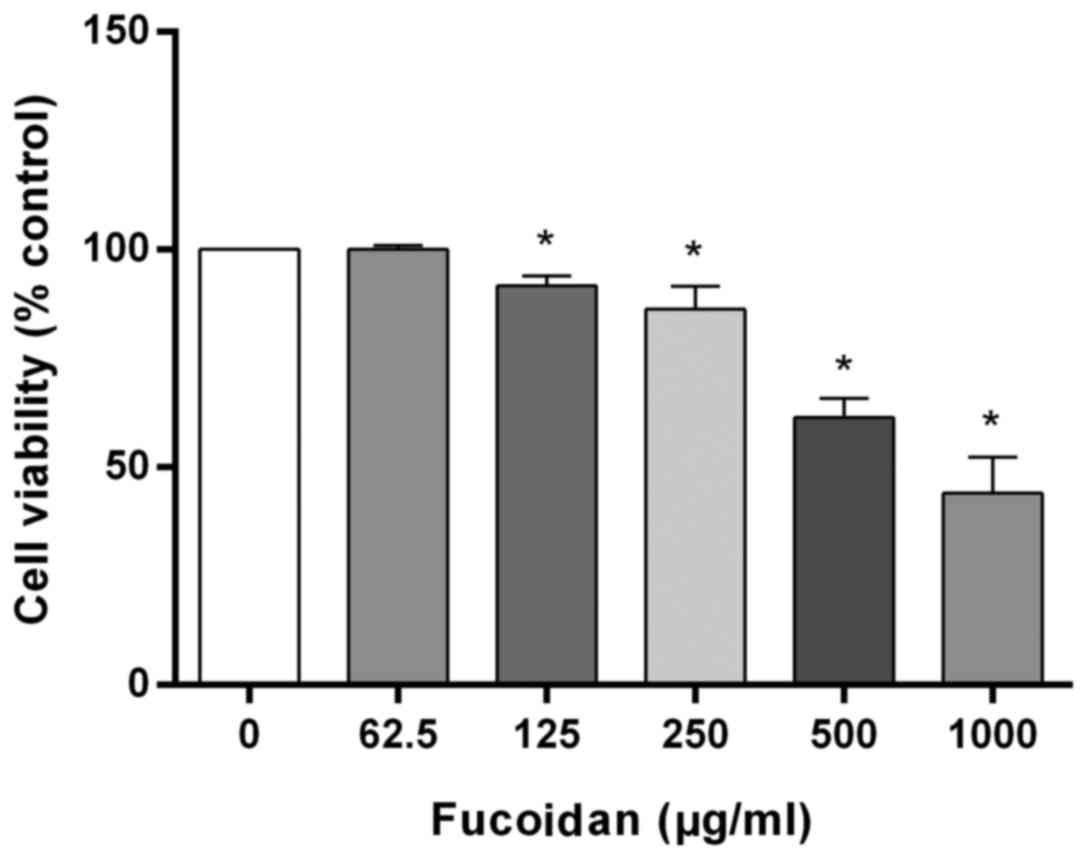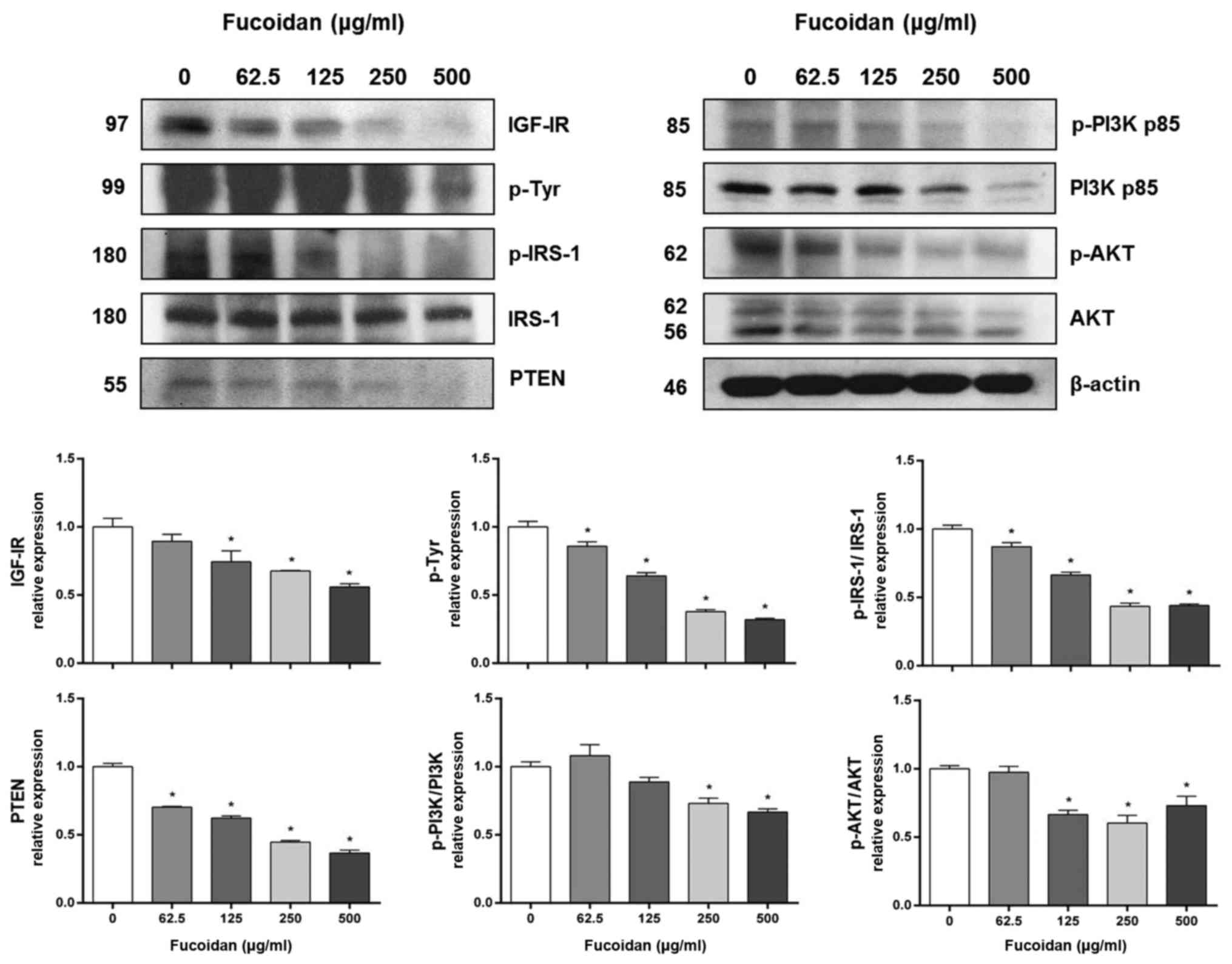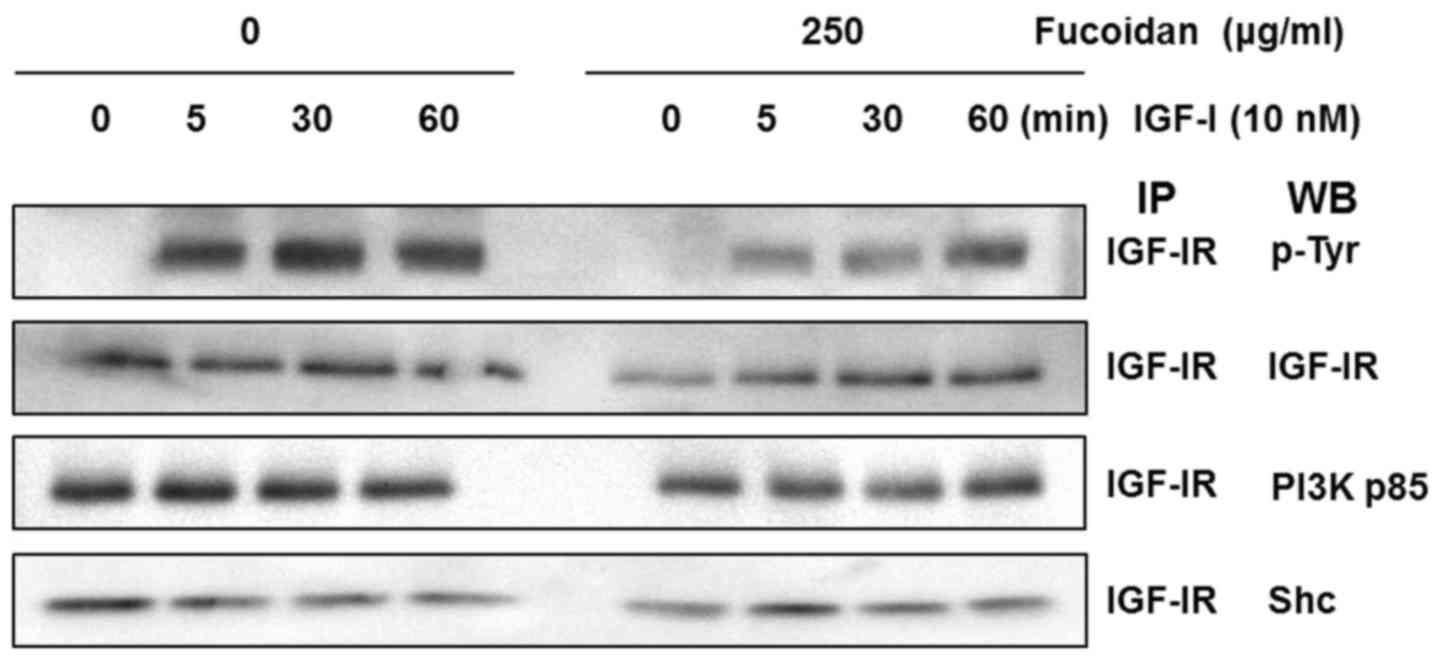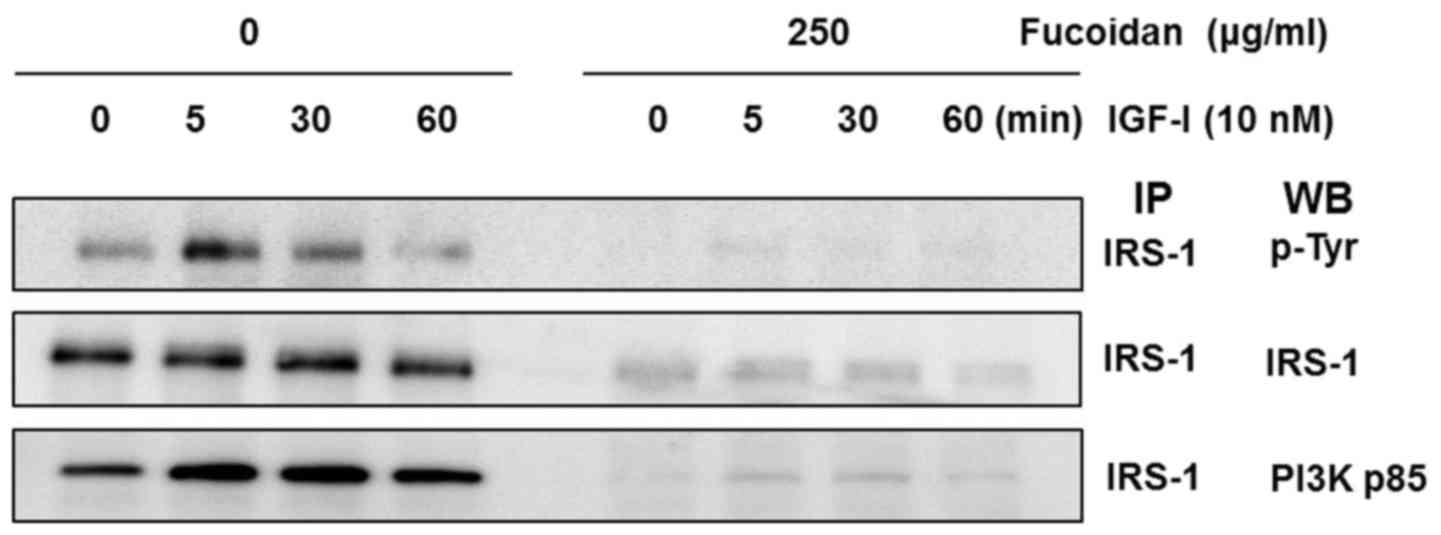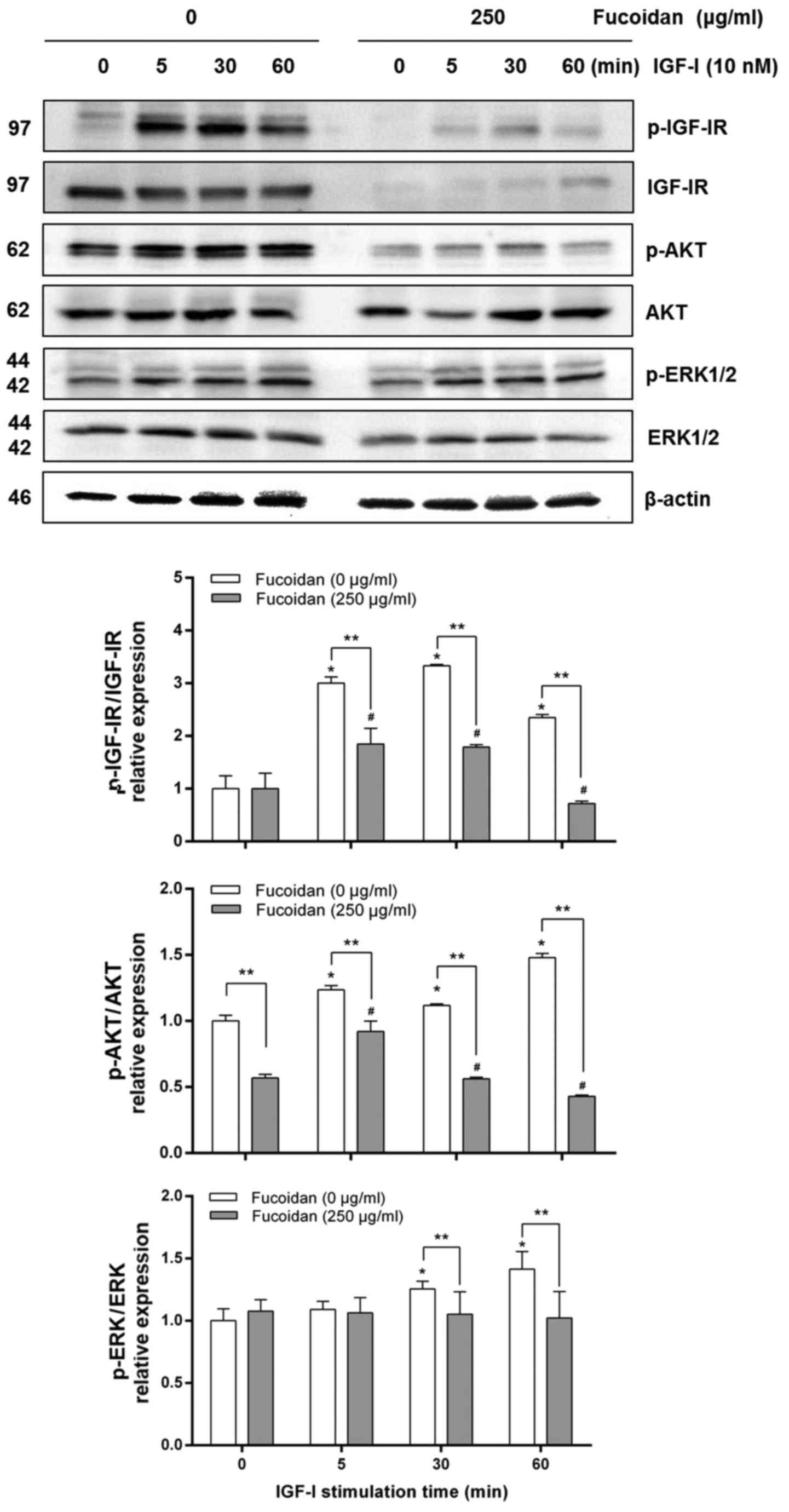|
1
|
Alwarsamy M, Gooneratne R and Ravichandran
R: Effect of fucoidan from Turbinaria conoides on human lung
adenocarcinoma epithelial (A549) cells. Carbohydr Polym.
152:207–213. 2016. View Article : Google Scholar : PubMed/NCBI
|
|
2
|
Siegel R, Desantis C and Jemal A:
Colorectal cancer statistics, 2014. CA Cancer J Clin. 64:104–117.
2014. View Article : Google Scholar : PubMed/NCBI
|
|
3
|
Hayat MJ, Howlader N, Reichman ME and
Edwards BK: Cancer statistics, trends, and multiple primary cancer
analyses from the Surveillance, Epidemiology, and End Results
(SEER) Program. Oncologist. 12:20–37. 2007. View Article : Google Scholar : PubMed/NCBI
|
|
4
|
Li B, Lu F, Wei X and Zhao R: Fucoidan:
Structure and bioactivity. Molecules. 13:1671–1695. 2008.
View Article : Google Scholar : PubMed/NCBI
|
|
5
|
Bilan MI, Grachev AA, Ustuzhanina NE,
Shashkov AS, Nifantiev NE and Usov AI: Structure of a fucoidan from
the brown seaweed Fucus evanescens C. Ag. Carbohydr Res.
337:719–730. 2002. View Article : Google Scholar : PubMed/NCBI
|
|
6
|
Chen A, Lan Y, Liu J, Zhang F, Zhang L, Li
B and Zhao X: The structure property and endothelial protective
activity of fucoidan from Laminaria japonica. Int J Biol Macromol.
105:1421–1429. 2017. View Article : Google Scholar : PubMed/NCBI
|
|
7
|
Moussavou G, Kwak DH, Obiang-Obonou BW,
Maranguy CA, Dinzouna-Boutamba SD, Lee DH, Pissibanganga OG, Ko K,
Seo JI and Choo YK: Anticancer effects of different seaweeds on
human colon and breast cancers. Mar Drugs. 12:4898–4911. 2014.
View Article : Google Scholar : PubMed/NCBI
|
|
8
|
Yang WN, Chen PW and Huang CY:
Compositional characteristics and in vitro evaluations of
antioxidant and neuroprotective properties of crude extracts of
fucoidan prepared from compressional puffing-pretreated Sargassum
crassifolium. Mar Drugs. 15:E1832017. View Article : Google Scholar : PubMed/NCBI
|
|
9
|
Palanisamy S, Vinosha M, Marudhupandi T,
Rajasekar P and Prabhu NM: In vitro antioxidant and antibacterial
activity of sulfated polysaccharides isolated from Spatoglossum
asperum. Carbohydr Polym. 170:296–304. 2017. View Article : Google Scholar : PubMed/NCBI
|
|
10
|
Palanisamy S, Vinosha M, Marudhupandi T,
Rajasekar P and Prabhu NM: Isolation of fucoidan from Sargassum
polycystum brown algae: Structural characterization, in vitro
antioxidant and anticancer activity. Int J Biol Macromol.
102:405–412. 2017. View Article : Google Scholar : PubMed/NCBI
|
|
11
|
Phull AR, Majid M, Haq IU, Khan MR and Kim
SJ: In vitro and in vivo evaluation of anti-arthritic, antioxidant
efficacy of fucoidan from Undaria pinnatifida (Harvey) Suringar.
Int J Biol Macromol. 97:468–480. 2017. View Article : Google Scholar : PubMed/NCBI
|
|
12
|
Ryu MJ and Chung HS: Fucoidan reduces
oxidative stress by regulating the gene expression of HO 1 and SOD
1 through the Nrf2/ERK signaling pathway in HaCaT cells. Mol Med
Rep. 14:3255–3260. 2016. View Article : Google Scholar : PubMed/NCBI
|
|
13
|
Heeba GH and Morsy MA: Fucoidan
ameliorates steatohepatitis and insulin resistance by suppressing
oxidative stress and inflammatory cytokines in experimental
non-alcoholic fatty liver disease. Environ Toxicol Pharmacol.
40:907–914. 2015. View Article : Google Scholar : PubMed/NCBI
|
|
14
|
Rui X, Pan HF, Shao SL and Xu XM:
Anti-tumor and anti-angiogenic effects of Fucoidan on prostate
cancer: Possible JAK-STAT3 pathway. BMC Complement Altern Med.
17:3782017. View Article : Google Scholar : PubMed/NCBI
|
|
15
|
Liu F, Luo G, Xiao Q and Chen L, Luo X, Lv
J and Chen L: Fucoidan inhibits angiogenesis induced by multiple
myeloma cells. Oncol Rep. 36:1963–1972. 2016. View Article : Google Scholar : PubMed/NCBI
|
|
16
|
Zhang Z, Till S, Jiang C, Knappe S,
Reutterer S, Scheiflinger F, Szabo CM and Dockal M:
Structure-activity relationship of the pro- and anticoagulant
effects of Fucus vesiculosus fucoidan. Thromb Haemost. 111:429–437.
2014. View Article : Google Scholar : PubMed/NCBI
|
|
17
|
Cumashi A, Ushakova NA, Preobrazhenskaya
ME, D'Incecco A, Piccoli A, Totani L, Tinari N, Morozevich GE,
Berman AE, Bilan MI, et al Consorzio Interuniversitario Nazionale
per la Bio-Oncologia, Italy, : A comparative study of the
anti-inflammatory, anticoagulant, antiangiogenic, and antiadhesive
activities of nine different fucoidans from brown seaweeds.
Glycobiology. 17:541–552. 2007. View Article : Google Scholar : PubMed/NCBI
|
|
18
|
Shen HY, Li LZ, Xue KC, Hu DD and Gao YJ:
Antitumor activity of fucoidan in anaplastic thyroid cancer via
apoptosis and anti-angiogenesis. Mol Med Rep. 15:2620–2624. 2017.
View Article : Google Scholar : PubMed/NCBI
|
|
19
|
Hsu HY, Lin TY, Lu MK, Leng PJ, Tsao SM
and Wu YC: Fucoidan induces Toll-like receptor 4-regulated reactive
oxygen species and promotes endoplasmic reticulum stress-mediated
apoptosis in lung cancer. Sci Rep. 7:449902017. View Article : Google Scholar : PubMed/NCBI
|
|
20
|
Xue M, Ji X, Xue C, Liang H, Ge Y, He X
and Zhang L, Bian K and Zhang L: Caspase-dependent and
caspase-independent induction of apoptosis in breast cancer by
fucoidan via the PI3K/AKT/GSK3β pathway in vivo and in vitro.
Biomed Pharmacother. 94:898–908. 2017. View Article : Google Scholar : PubMed/NCBI
|
|
21
|
Cho Y, Cho EJ, Lee JH, Yu SJ, Kim YJ, Kim
CY and Yoon JH: Fucoidan-induced ID-1 suppression inhibits the in
vitro and in vivo invasion of hepatocellular carcinoma cells.
Biomed Pharmacother. 83:607–616. 2016. View Article : Google Scholar : PubMed/NCBI
|
|
22
|
Somasundaram SN, Shanmugam S, Subramanian
B and Jaganathan R: Cytotoxic effect of fucoidan extracted from
Sargassum cinereum on colon cancer cell line HCT-15. Int J Biol
Macromol. 91:1215–1223. 2016. View Article : Google Scholar : PubMed/NCBI
|
|
23
|
Kim IH, Kwon MJ and Nam TJ: Differences in
cell death and cell cycle following fucoidan treatment in
high-density HT-29 colon cancer cells. Mol Med Rep. 15:4116–4122.
2017. View Article : Google Scholar : PubMed/NCBI
|
|
24
|
Han MH, Lee DS, Jeong JW, Hong SH, Choi
IW, Cha HJ, Kim S, Kim HS, Park C, Kim GY, et al: Fucoidan induces
ROS-dependent apoptosis in 5637 human bladder cancer cells by
downregulating telomerase activity via inactivation of the PI3K/Akt
signaling pathway. Drug Dev Res. 78:37–48. 2017. View Article : Google Scholar : PubMed/NCBI
|
|
25
|
Xue M, Ge Y, Zhang J, Liu Y, Wang Q, Hou L
and Zheng Z: Fucoidan inhibited 4T1 mouse breast cancer cell growth
in vivo and in vitro via downregulation of Wnt/β-catenin signaling.
Nutr Cancer. 65:460–468. 2013. View Article : Google Scholar : PubMed/NCBI
|
|
26
|
Park HY, Kim GY, Moon SK, Kim WJ, Yoo YH
and Choi YH: Fucoidan inhibits the proliferation of human urinary
bladder cancer T24 cells by blocking cell cycle progression and
inducing apoptosis. Molecules. 19:5981–5998. 2014. View Article : Google Scholar : PubMed/NCBI
|
|
27
|
Han YS, Lee JH and Lee SH: Antitumor
effects of fucoidan on human colon cancer cells via activation of
Akt signaling. Biomol Ther (Seoul). 23:225–232. 2015. View Article : Google Scholar : PubMed/NCBI
|
|
28
|
Yang G, Zhang Q, Kong Y, Xie B, Gao M, Tao
Y, Xu H, Zhan F, Dai B, Shi J, et al: Antitumor activity of
fucoidan against diffuse large B cell lymphoma in vitro and in
vivo. Acta Biochim Biophys Sin (Shanghai). 47:925–931. 2015.
View Article : Google Scholar : PubMed/NCBI
|
|
29
|
Atashrazm F, Lowenthal RM, Woods GM,
Holloway AF, Karpiniec SS and Dickinson JL: Fucoidan suppresses the
growth of human acute promyelocytic leukemia cells in vitro and in
vivo. J Cell Physiol. 231:688–697. 2016. View Article : Google Scholar : PubMed/NCBI
|
|
30
|
Scagliotti GV and Novello S: The role of
the insulin-like growth factor signaling pathway in non-small cell
lung cancer and other solid tumors. Cancer Treat Rev. 38:292–302.
2012. View Article : Google Scholar : PubMed/NCBI
|
|
31
|
Xu L, Zhou R, Yuan L, Wang S, Li X, Ma H,
Zhou M, Pan C, Zhang J, Huang N, et al: IGF1/IGF1R/STAT3
signaling-inducible IFITM2 promotes gastric cancer growth and
metastasis. Cancer Lett. 393:76–85. 2017. View Article : Google Scholar : PubMed/NCBI
|
|
32
|
Frasca F, Pandini G, Sciacca L, Pezzino V,
Squatrito S, Belfiore A and Vigneri R: The role of insulin
receptors and IGF-I receptors in cancer and other diseases. Arch
Physiol Biochem. 114:23–37. 2008. View Article : Google Scholar : PubMed/NCBI
|
|
33
|
Park HK, Kim IH, Kim J and Nam TJ:
Induction of apoptosis by laminarin, regulating the insulin-like
growth factor-IR signaling pathways in HT-29 human colon cells. Int
J Mol Med. 30:734–738. 2012. View Article : Google Scholar : PubMed/NCBI
|
|
34
|
Lee HS, Cho HJ, Kwon GT and Park JH:
Kaempferol downregulates insulin-like growth factor-I receptor and
ErbB3 signaling in HT-29 human colon cancer cells. J Cancer Prev.
19:161–169. 2014. View Article : Google Scholar : PubMed/NCBI
|
|
35
|
Fidler MJ, Shersher DD, Borgia JA and
Bonomi P: Targeting the insulin-like growth factor receptor pathway
in lung cancer: Problems and pitfalls. Ther Adv Med Oncol. 4:51–60.
2012. View Article : Google Scholar : PubMed/NCBI
|
|
36
|
Yu H and Rohan T: Role of the insulin-like
growth factor family in cancer development and progression. J Natl
Cancer Inst. 92:1472–1489. 2000. View Article : Google Scholar : PubMed/NCBI
|
|
37
|
Vishchuk OS, Sun H, Wang Z, Ermakova SP,
Xiao J, Lu T, Xue P, Zvyagintseva TN, Xiong H, Shao C, et al:
PDZ-binding kinase/T-LAK cell-originated protein kinase is a target
of the fucoidan from brown alga Fucus evanescens in the prevention
of EGF-induced neoplastic cell transformation and colon cancer
growth. Oncotarget. 7:18763–18773. 2016. View Article : Google Scholar : PubMed/NCBI
|
|
38
|
Kim EJ, Kang IJ, Cho HJ, Kim WK, Ha YL and
Park JH: Conjugated linoleic acid downregulates insulin-like growth
factor-I receptor levels in HT-29 human colon cancer cells. J Nutr.
133:2675–2681. 2003. View Article : Google Scholar : PubMed/NCBI
|
|
39
|
Pollak MN, Schernhammer ES and Hankinson
SE: Insulin-like growth factors and neoplasia. Nat Rev Cancer.
4:505–518. 2004. View
Article : Google Scholar : PubMed/NCBI
|
|
40
|
Han YS, Lee JH and Lee SH: Fucoidan
inhibits the migration and proliferation of HT-29 human colon
cancer cells via the phosphoinositide-3 kinase/Akt/mechanistic
target of rapamycin pathways. Mol Med Rep. 12:3446–3452. 2015.
View Article : Google Scholar : PubMed/NCBI
|
|
41
|
Thinh PD, Menshova RV, Ermakova SP,
Anastyuk SD, Ly BM and Zvyagintseva TN: Structural characteristics
and anticancer activity of fucoidan from the brown alga Sargassum
mcclurei. Mar Drugs. 11:1456–1476. 2013. View Article : Google Scholar : PubMed/NCBI
|
|
42
|
Kim EJ, Park SY, Lee JY and Park JH:
Fucoidan present in brown algae induces apoptosis of human colon
cancer cells. BMC Gastroenterol. 10:962010. View Article : Google Scholar : PubMed/NCBI
|
|
43
|
Hyun JH, Kim SC, Kang JI, Kim MK, Boo HJ,
Kwon JM, Koh YS, Hyun JW, Park DB, Yoo ES, et al: Apoptosis
inducing activity of fucoidan in HCT-15 colon carcinoma cells. Biol
Pharm Bull. 32:1760–1764. 2009. View Article : Google Scholar : PubMed/NCBI
|
|
44
|
Fedorov SN, Shubina LK, Bode AM, Stonik VA
and Dong Z: Dactylone inhibits epidermal growth factor-induced
transformation and phenotype expression of human cancer cells and
induces G1-S arrest and apoptosis. Cancer Res. 67:5914–5920. 2007.
View Article : Google Scholar : PubMed/NCBI
|
|
45
|
Park HK, Kim IH, Kim J and Nam TJ:
Induction of apoptosis and the regulation of ErbB signaling by
laminarin in HT-29 human colon cancer cells. Int J Mol Med.
32:291–295. 2013. View Article : Google Scholar : PubMed/NCBI
|
|
46
|
Ji CF and Ji YB: Laminarin-induced
apoptosis in human colon cancer LoVo cells. Oncol Lett.
7:1728–1732. 2014. View Article : Google Scholar : PubMed/NCBI
|
|
47
|
Ji YB, Ji CF and Zhang H: Laminarin
induces apoptosis of human colon cancer LOVO cells through a
mitochondrial pathway. Molecules. 17:9947–9960. 2012. View Article : Google Scholar : PubMed/NCBI
|
|
48
|
Guo YS, Narayan S, Yallampalli C and Singh
P: Characterization of insulinlike growth factor I receptors in
human colon cancer. Gastroenterology. 102:1101–1108. 1992.
View Article : Google Scholar : PubMed/NCBI
|
|
49
|
Franke TF, Kaplan DR and Cantley LC: PI3K:
Downstream AKTion blocks apoptosis. Cell. 88:435–437. 1997.
View Article : Google Scholar : PubMed/NCBI
|
|
50
|
Park HY, Park SH, Jeong JW, Yoon D, Han
MH, Lee DS, Choi G, Yim MJ, Lee JM, Kim DH, et al: Induction of
p53-independent apoptosis and G1 cell cycle arrest by fucoidan in
HCT116 human colorectal carcinoma cells. Mar Drugs. 15:E1542017.
View Article : Google Scholar : PubMed/NCBI
|
|
51
|
Worrall C, Suleymanova N, Crudden C,
Trocoli Drakensjö I, Candrea E, Nedelcu D, Takahashi SI, Girnita L
and Girnita A: Unbalancing p53/Mdm2/IGF-1R axis by Mdm2 activation
restrains the IGF-1-dependent invasive phenotype of skin melanoma.
Oncogene. 36:3274–3286. 2017. View Article : Google Scholar : PubMed/NCBI
|
|
52
|
Pagliara V, Saide A, Mitidieri E,
d'Emmanuele di Villa Bianca R, Sorrentino R, Russo G and Russo A:
5-FU targets rpL3 to induce mitochondrial apoptosis via
cystathionine-β-synthase in colon cancer cells lacking p53.
Oncotarget. 7:50333–50348. 2016. View Article : Google Scholar : PubMed/NCBI
|
|
53
|
Russo A, Saide A, Cagliani R, Cantile M,
Botti G and Russo G: rpL3 promotes the apoptosis of p53 mutated
lung cancer cells by down-regulating CBS and NFκB upon 5-FU
treatment. Sci Rep. 6:383692016. View Article : Google Scholar : PubMed/NCBI
|















